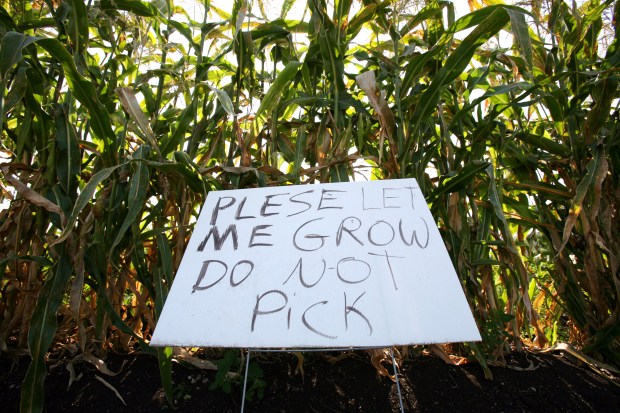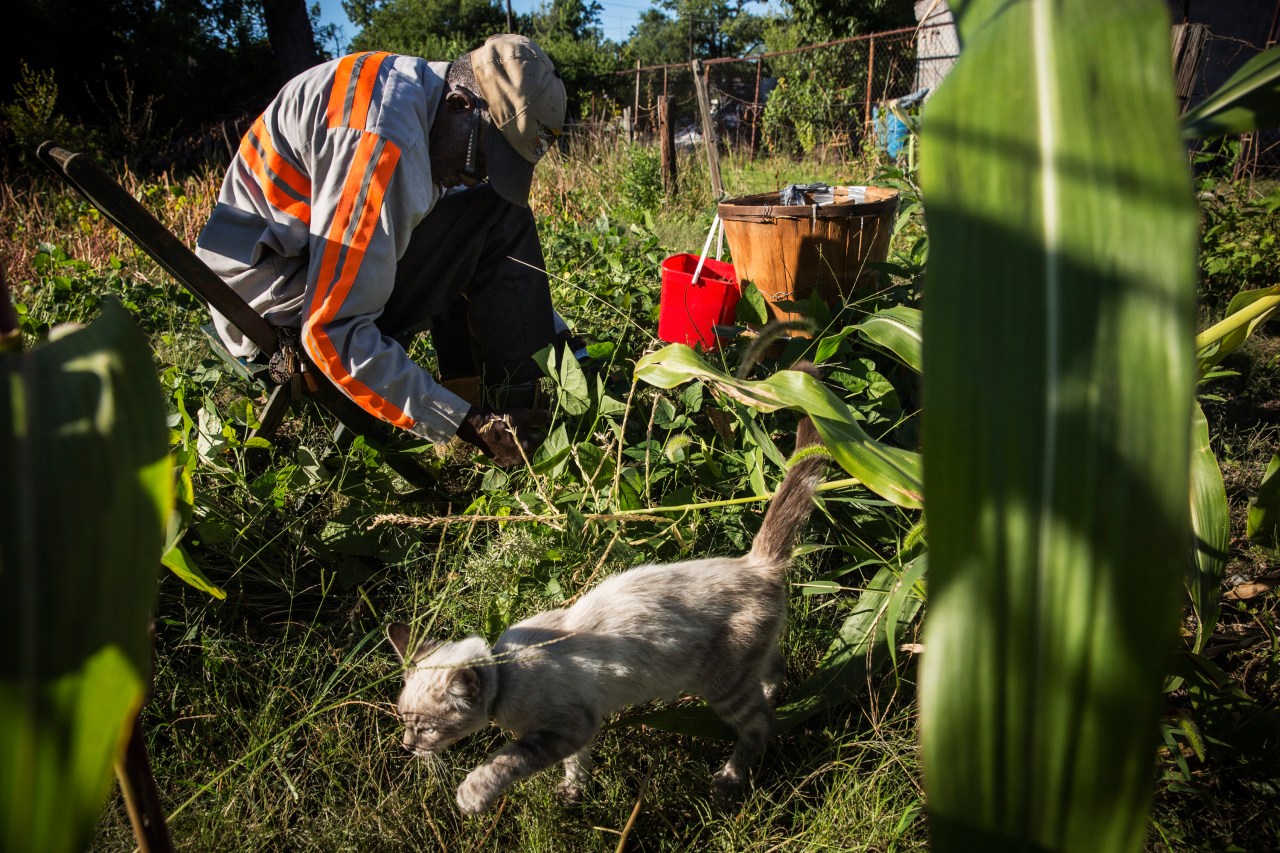In Detroit, nearly half of the city’s households have limited access to safe and nutritious foods. However, the city is home to innovation in food accessibility, and one of those innovations is urban gardening. According to Keep Growing Detroit, a nonprofit that supports urban gardening projects, the number of Detroit’s urban gardens grew from 80 farms in 2004 to more than 1,500 in 2017.
Malik Yakini is the head of the Detroit Black Community Food Security Network which, alongside its advocacy and policy work, operates the seven-acre D-Town Community Farm in Rouge Park. For more than a decade, he has led efforts to provide education on nutrition, improve food access, and use food production as a means of economic empowerment for African-Americans. In the Detroit episode of Parts Unknown in 2013, he spoke with Anthony Bourdain about efforts to reshape the city’s future through food. Aleesa Mann recently checked in with Yakini.
Aleesa Mann: How did you get started in urban agricultural work?
Malik Yakini: I was principal of Nsoroma Institute, an African-centered school that I had co-founded in 1989, and in about 1999 we started doing gardening with children at the school. We developed a food security curriculum, which required every teacher in the school to have at least one lesson that had a food security tie-in each week. We were trying to make this a part of the school culture.
We started the school garden and the food security curriculum within the school, and then we started having parents and staff members saying, “Well, I’d like to have a garden in my backyard or in the vacant lot next to my house,” and so we created the Shamba Organic Garden Collective. In this collective, we had about 20 staff members or parents who started gardens in backyards and vacant lots. We did that from 2003 until 2006.
Mann: What inspired you to create the Detroit Black Community Food Security Network?
Yakini: In 2005 I went to a meeting of a national organization called the Community Food Security Coalition in Atlanta, and they were having a really robust discussion about race in the food system, particularly about race in the burgeoning food movement. What I discovered in that conference was that throughout the country much of the work being called food security work or urban agriculture was being done in either black or brown communities but the work was being done by white-led nonprofit organizations. That reflected what we saw happening in Detroit at the time, and with Detroit being a majority African-American city, it was our view that black people should not only participate in the movement in a serious way but also that we should be leading the movement. The combination of wanting to make sure that we had a vehicle for black people to participate in a robust way in the movement and also needing a larger container to hold the work that was developing at the school caused us to form the Detroit Black Community Food Security Network in February 2006. This is the organization that ran the farm that Anthony Bourdain came to.
Mann: It’s been five years since Bourdain was there at the D-Town Farm. Have there been many changes on the farm?
Yakini: Around that time in 2013, the Detroit Urban Agriculture Ordinance was passed, legalizing agriculture in Detroit and prescribing the ways in which that should be done. That was a significant milestone. Since that time, our farm has added some significant components. We have an eight-kilowatt solar power station that we added in 2015. We have a 50,000-gallon rainwater water retention pond that we added in 2015. We have increased our production. I think those would be the main things since that time. We haven’t added more land, but our management has improved, and as a result, production has increased.

Mann: How have attitudes toward food, food culture, and farming changed in Detroit since 2013?
Yakini: Generally there’s a greater awareness of the role of food in the revitalization of the city of Detroit. I think there’s been a burgeoning restaurant scene that has developed rapidly in the last few years, which I have mixed views on because a lot of the new restaurants are indicators of the gentrification of neighborhoods. Maybe it’s a mixed blessing. Some of them are buying local food from local farmers, and in that way, perhaps it’s contributing to the local grassroots food movement, but many of the restaurants are high-end restaurants that are frequented by mainly new young whites who have moved into the city of Detroit.
Mann: Has the Flint water crisis affected the work that you’re doing?
Yakini: I don’t know if it’s affected us directly because we’re not in Flint, but there is a water crisis in Detroit as well. It’s a different type of crisis. The crisis in Flint had to do with lead pipes and lead leaching from the pipes into the water. There’s currently a similar problem in Detroit. In fact, all Detroit public schools have prohibited students from drinking tap water in the schools. They were bringing in bottled water because some testing was done in the last two or three months that found significant levels of lead in many schools in the city of Detroit. In that sense, we do share that crisis with Flint. The other crisis Detroit has experienced in the last five years is that there’s been massive water shut-offs, and you can’t prepare healthy meals without running water.
Mann: How is food security in Detroit affected by other aspects of city life?
Yakini: The problem of food access is coupled with the transportation challenges in the city because Detroit in the 20th century really came to international prominence as the automobile manufacturing capital of the world. Public transportation was intentionally underdeveloped in Detroit so as to encourage people to buy automobiles. The only public transportation in Detroit right now is the public bus system.
In the last year or so, there is a light rail that opened that travels about two miles from what’s being called midtown to downtown, and [that] doesn’t serve the vast majority of the city. Those areas, midtown and downtown, are the most highly gentrified areas of the city. If you don’t have transportation, if you don’t have access to an automobile, which 40 percent of Detroiters don’t have, then you’re relegated to obtaining your food from what we call in Detroit party stores, the stores that are close to you, within walking distance, or even worse, gas stations. Many Detroiters have a difficult time accessing food because of the lack of transportation.

Mann: I know the Detroit Black Community Food Security Network is working on a new project, the Detroit Food Commons. Where are you all in developing that project, and why is this one way that you want to start addressing food security in the city?
Yakini: The Detroit Food Commons is a 33,000-square-foot new building that we’re building, and the cornerstone of that would be the Detroit People’s Food Co-op, a cooperatively owned grocery store. We think that co-op is important, particularly because of the style of development that we see happening in Detroit now is a style of development that is led by wealthy, white men in a city that is at least 80 percent African-American. We push back heavily against that kind of style of development that sees us as just consumers in a system that somebody else owns and think that co-ops are probably the only way within the context of a capitalist system for communities, particularly communities like ours, that have been intentionally disinvested in, to galvanize our economic power and build a sense of democracy and have say-so and control over the institutions in our community. It’s a very important alternative to the kind of extractive economy that generally operates in the black community of Detroit and most black communities throughout the United States.
Mann: What are younger people bringing into this work that is different or surprising to you?
Yakini: One of the things that I’ve seen in many younger activists in the food movement is that they are bringing an awareness of the importance of self-care. The generation that I come from approached movement work with the philosophy that you just put your nose to the grindstone 24/7 and you keep it there and if you ever let up, then somehow you’re a traitor to the people. Clearly that thinking is not sustainable, either for the movement or for individuals in the movement. Many younger people see the need for the centrality of self-care as being an important part of the work and not just tangential to the work, and I think that’s really significant.
This interview has been edited and condensed.